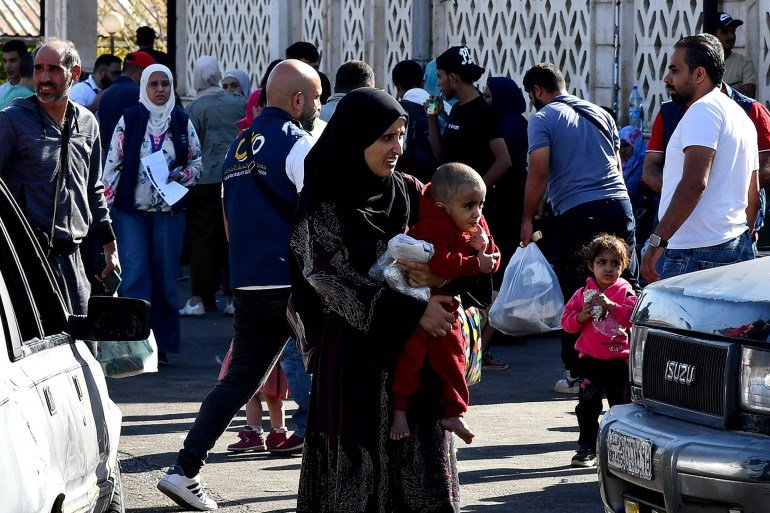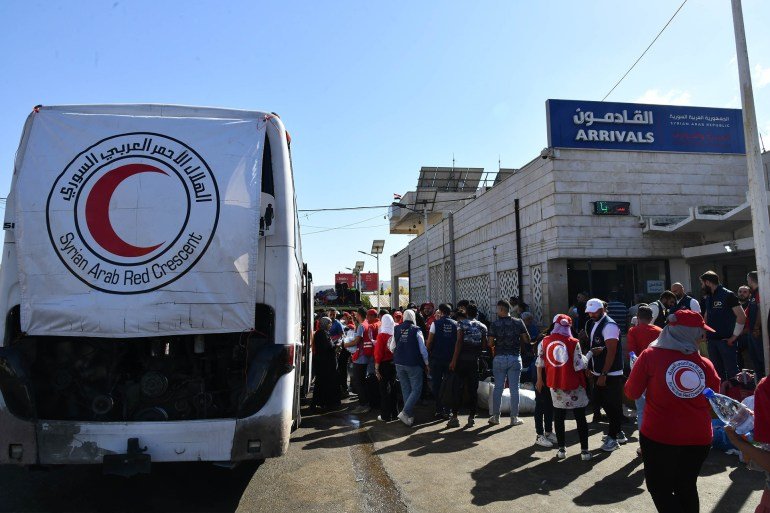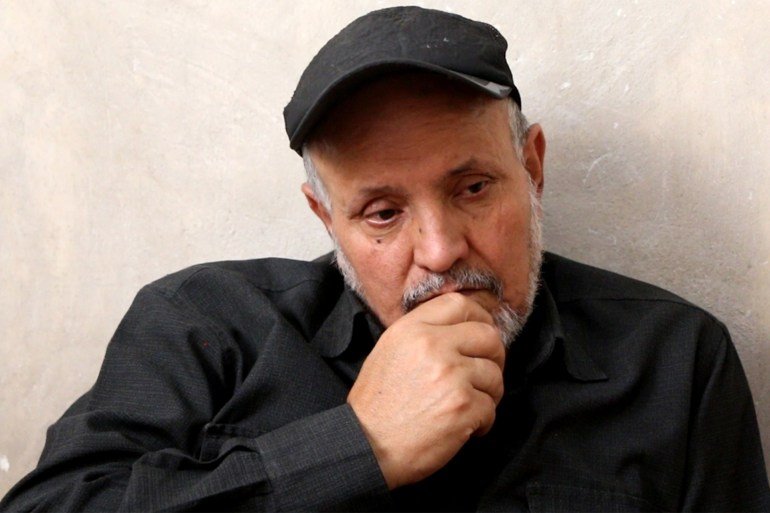Idlib- Syria experienced a reverse movement of displacement after the escalation of Israeli aggression against Lebanon, which pushed hundreds of thousands of Syrian refugees to return to escape the death they had previously fled.
The number of arrivals reached 239,000 Syrians, an endless statistic that increases every day, from areas of the southern suburbs of Beirut, Tyre, Sabra, Nabatieh and other cities and towns in southern Lebanon, in addition to the entry of 91,000 Syrians. Lebanese arrivals.
Around 235,000 Syrian refugees have been distributed across Syrian regime-controlled areas of Damascus, Homs, Hama and Tartous, while nearly 4,000 others have headed to the northern countryside areas of Aleppo and Idlib. in light of the almost total incapacity of local authorities. authorities to provide them with support or provide them with accommodation. Most of them live – temporarily – with relatives or in camps for displaced people.

Last night
Umm Muhammad returned with her family to Idlib after a journey of displacement that began in 2012 from the Tadamon neighborhood of Damascus – after her house was bombed – to Maarat al-Numan, Jabal al-Zawiya, and then to Lebanon in 2018, to escape the bombings, the horror of war and the barrel bombs of the Syrian regime. She experienced moments where she escaped death in Lebanon, repeating her journey of displacement and reaching northern Syria.
Speaking to Al Jazeera Net, the woman recalls a scene that does not leave her memory, with the assassination of two young men before her eyes, just one meter from them, in the middle of the night, during which the Hezbollah website Secretary General Hassan Nasrallah was targeted. Her last night was spent in the city of Tire and she fled on foot in the darkness of the night, lit by huge explosions, until she took refuge with her family at the embassy of Kuwait.
Umm Muhammad witnessed the destruction of her daughter’s home before her eyes, and her daughter and children survived it on her last night in southern Lebanon. The family then decided to leave the place that all the inhabitants had left.
But her situation was very difficult because they did not have a car, and she and her husband suffered from illnesses that prevented them from walking, and her children had difficulty getting them out of the area, where the bombings never stopped.
Umm Muhammad describes the scene and says: “The ground was as if it was boiling from the intensity of the bombing, and the children were screaming and crying, and the people could do nothing but flee on foot for long distances. distances, exhausting them with fatigue. and hunger. »
Her traveling trip lasted 4 days after leaving Tyre, and she spent 3 days next to the Kuwaiti embassy until they could get a flight to Syria due to the heavy crowds of passers-by at the Masnaa crossing between Lebanon and Syria.
But the missile evasion did not stop once it reached the border. She again witnessed the bombing which affected the crossing and almost cost her life again, causing a very large crater, forcing them to cross the road on foot and then be airlifted. bus to Syria.
Umm Muhammad called on international organizations and associations to guarantee housing for her and her family before the onset of winter, as she no longer has a place to live after losing her first house in the Tadamon district in Damascus due to bombings, then losing her home in Maarat al-Numan, where she cannot return now under Syrian regime control, she said.

Childhood tears
For her part, the child Massa (10 years old) could not hold back her tears remembering the moments she experienced running to escape death among the missiles that fell in her residential area, as if it was fiery lava coming down from the sky in “a horror movie”, as she told Al Jazeera Net.
She added: “We would run and hide under any wall or building. Sometimes I would lose my mother and father and sometimes I would find them again, and all this would happen during the night. I quickly left the house and I didn’t even have with me my toys, books and gifts from my companions in Lebanon.
As for Abu Muhammad, who fled the war in Syria to live with his son, who works in Lebanon, and who suffers from several illnesses and cannot walk long distances, the horror of the scene was much more difficult for him because it was “hindering the progress of the whole family”, according to what he told Al Jazeera Net.
He said: “I asked my children to leave me and go because I could no longer walk and no one could carry me, but they insisted on staying with me, which almost killed us after the fall of ‘a missile nearby. I killed two young men in front of my eyes and there was nothing we could do to them. »

An arduous journey
The exodus of Abu Muhammad extended from Tire to Sabra, then under the horror of massive bombings which caused considerable and complete destruction, forcing all the Lebanese, Syrians and Palestinians in the region to flee, that very night where Nasrallah’s house was bombed, which is approximately Only one kilometer.
He continued: “I didn’t imagine I would survive due to my health, but fate and the goodness of God saved me from death more than once until we arrived with a lot of others at the Kuwaiti embassy where we took refuge, until we could find a time to cross to Syria because we don’t have a car and have to queue to get a ride. Lebanese bus. ” Which brought us to the factory passage. “
After that, Abu Muhammad and those who accompanied him headed towards Damascus and passed through Homs, Hama and the town of Maarat al-Numan, where the man lived his childhood, but now – as he says – it is a ghost town empty of everything. inhabitants, then to Aleppo and from there to Manbij, which is controlled by the Syrian Democratic Forces and which “She gathered us in a large square and left us under the sun for long hours without food or water. most of us needed medication.
Abu Muhammad continues: “After hours of fatigue and heat, we had to walk on foot in a spectacle that became disturbing for us, especially for the elderly, women and children, as we carried bags to cross to the town of Jarabulus, which is under the control of the Syrian National Army.
Faced with this difficult reality, Muhammad Hallaj, director of the “Syrian Response Coordinators” team, urged, in a statement to Al Jazeera Net, humanitarian organizations working immediately to respond to the needs of those coming to the region and to prepare for the possibility of an increase in the number of refugees or displaced people.
